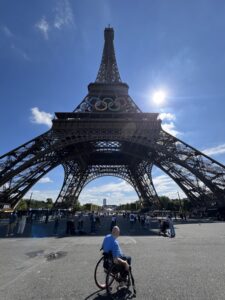I feel fortunate to have travelled to many parts of the world—North America, the UK, Europe, and even Oceania. This trip was a return to one of my favourite cities, Paris. But this time, it’s different. Paris is the host city for the Paralympic Games. The already busy city will add 4,000 athletes and tens of thousands of spectators, all competing for accessible resources like accommodations and transportation. I was motivated to go for the fencing, events, which many of you may already know is a passion of mine.
To make this trip successful, planning was a must. I usually start with accommodations. I chose to stay at a hotel I’ve used before. It’s a bit far from the venues I’m interested in, but I know it’s accessible, and the staff work hard to help me solve any problems I encounter. To secure the best rate, I booked and prepaid for the stay months in advance.
The next step was finding flights. To minimize connections and possible delays, I worked to find the most direct route: Winnipeg to Montreal to Paris. I chose flights with at least a three-hour connection. These flights were convenient but, as a result, more expensive.
The last part of the plan was securing wheelchair-accessible transport for when I arrived in the city. Months before the Paralympics, media outlets worldwide raised concerns about limited accessible transportation in Paris. Local disability groups recommended having three backup options for getting to and from the venues. I arranged two.
With the help of my hotel, I found a driver with an accessible van that could be reserved in advance by the hour, essentially an accessible limousine. I chose this option for airport and venue trips—secure and reliable, but costly. I also learned that one of the taxi companies had a fleet of accessible vans that could be booked as needed through an app. This option was less expensive but potentially limited in availability.
With my preplanning done, passport and credit card in hand, I was ready to begin the trip.
Join me for part two of this post in the coming days.




